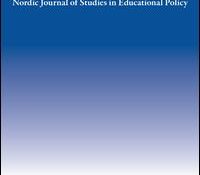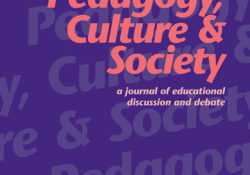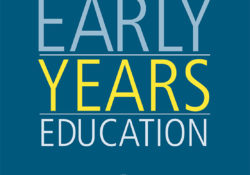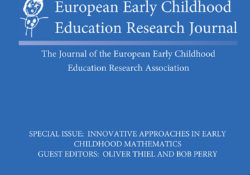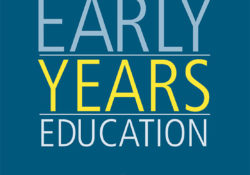tandfonline.com har udgivet en rapport under søgningen “Teacher Education Mathematics”: ABSTRACT ABSTRACT Our aim in this article is to examine policy discourses that promote positional changes for the preschool class in the Swedish educational system. The preschool class is currently going through a watershed period, which is characterized by uncertainty regarding its position in the education system. In this article, we explore changes in the Swedish education system by analysing policy documents from 1997 to 2017 with a specific focus on the positional shift of the preschool class. The departure point for our study is that policy relates to the concepts of subjectification, qualification and socialization. In addition, we examine how these goals in education are to be achieved and the educational restructuring required to do this. The findings show… Continue Reading →
Like this:
Like Loading...

tandfonline.com har udgivet en rapport under søgningen “Teacher Education Mathematics”: ABSTRACT ABSTRACT We investigated whether preschoolers’ social-emotional competencies predict their peer relationships and academic achievements during grade one. Measures of cool and hot executive functions, theory of mind, social-problem-solving, and peer acceptance were administered to a sample of 48 preschoolers (M = 77.91 months). Academic achievement and peer acceptance were assessed at the end of Grade 1. A path analysis revealed that cool and hot executive functioning during preschool had a direct impact on academic achievement in elementary school and an indirect effect on peer acceptance via the theory of mind and social-problem-solving, respectively. Further, peer acceptance in preschool had a positive direct effect on peer acceptance during grade one. These findings indicate the vital role of social-emotional competencies on peer relationships and… Continue Reading →
Like this:
Like Loading...
eric.ed.gov har udgivet: HIPPY targeted parents of children zoned to 100 Houston Independent School District (HISD) elementary campuses during the 2018-2019 academic year, which reflected an increase from 80 campuses the previous year. Academic performance of students whose parents participated in HIPPY was assessed using the kindergarten 2018 Logramos and Iowa assessments, the prekindergarten CIRCLE assessment, and the combined English and Spanish STAAR 3-8. HIPPY kindergarten students attained higher mean normal curve equivalent (NCE) scores on the Logramos reading and mathematics subtests compared to the district, and comparable Iowa mathematics subtest scores as the district. CIRCLE results revealed that the majority of HIPPY students met benchmark by EOY on English and Spanish mathematics subtests. However, by EOY, students’ performance fell below the district on most CIRCLE English math subtests. Students… Continue Reading →
Like this:
Like Loading...
eric.ed.gov har udgivet: When presenting results from rigorous, field-based evaluations of educational interventions, researchers often reveal methodological barriers they face in designing studies to assessing program effectiveness. The evaluations funded by the Investing in Innovation Fund (i3) present a timely opportunity for identifying relevant and pressing issues arising in current education evaluations. With over $1 billion dollars invested in the implementation and evaluation of 117 education interventions, the i3 program represents a major investment by the U.S. Department of Education in educational interventions that will both serve students, teachers and schools, and generate evidence about intervention effectiveness. The breadth and number of i3 evaluations provides a unique opportunity to learn about the features of, and challenges encountered in, the design and implementation of the evaluations. Researchers from the National Evaluation… Continue Reading →
Like this:
Like Loading...
tandfonline.com har udgivet en rapport under søgningen “Teacher Education Mathematics”: ABSTRACT ABSTRACT In the present study we focus on physical touch that is judged to be just outside what is considered to be ‘normal’. We explore how preschool teachers describe and explain situations where educators give children too much or too little touching. Semi-structured interviews have been conducted with 30 qualified preschool teachers working in Swedish preschools. When the informants talk about situations where educators give children too much touching, the descriptions involve a behaviour that does not lie within the preschool mission, teachers who do not set boundaries, and actions that have disadvantages for the children. On the other hand, situations where educators give children too little touching are described solely with reference to the teacher and that person’s… Continue Reading →
Like this:
Like Loading...
tandfonline.com har udgivet en rapport under søgningen “Teacher Education Mathematics”: ABSTRACT ABSTRACT The present study examines adult–child touch and its functions in a Swedish preschool (for 1 to 5-year-old children). The data are naturalistic observations and video-recorded data of everyday preschool activities. The study describes the frequently occurring functions of educators’ haptic conduct (control, affectionate, affectionate-control, assisting and educative touch), discussing them in relation to the children’s age, gender and type of the preschool activity. It reveals the complexity of touch, demonstrating that physical contact is used for a variety of purposes in the educators’ daily work. The educators employed touch without force, and the children did not respond with explicit and forceful resistance (such as pushing back or otherwise protesting). Adult-initiated haptic behaviour served a continuum of social purposes… Continue Reading →
Like this:
Like Loading...
tandfonline.com har udgivet en rapport under søgningen “Teacher Education Mathematics”: ABSTRACT ABSTRACT This study explores preschool children’s mathematizing in everyday block play activities. Building on an ethnomethodological and multimodal conversation analytic framework, we explore how geometry (i.e. spatiality, shape, and symmetry) is actualized in children’s verbal and embodied interaction with their peers, pedagogues, and material environment. The selected data are drawn from a video ethnographic study in a Swedish preschool in which a boy and a girl play with a magnetic construction toy. The results of the study demonstrate how the participants orient to spatial locations, properties, dimensions, orientations, transformations, and shapes as they build a house. The children are shown to rely upon verbal and embodied resources such as deictics (e.g. here, there, these) and pointing gestures as geometrical aspects are… Continue Reading →
Like this:
Like Loading...
tandfonline.com har udgivet en rapport under søgningen “Teacher Education Mathematics”: ABSTRACT ABSTRACT Numerous initiatives are carried out across the world to support science teaching in early childhood education. However, professional development research shows that in order for teaching interventions to bring about successful changes in practice, it is key that teacher’s beliefs, confidence and knowledge change. As a complement to studies showing how teachers change, this article examines why teachers adopt a pedagogical idea for teaching science in preschool. Drawing on Clarke and Hollingsworth’s model for teacher professional growth, the article analyses interviews with teachers that have implemented and developed a pedagogical idea for teaching science in preschool. The results indicate that teachers adopt the pedagogical idea because it helps them to discern and build on science content in everyday… Continue Reading →
Like this:
Like Loading...
eric.ed.gov har udgivet: This study was carried out to determine whether there is a relationship between the preschool teachers’ attitudes towards mathematics and mathematical development in 6-year-old preschool children. The sampling of the study was consisted of 30 teachers working with 6 years old children and their 120 students in public kindergartens and independent preschool classrooms in Erzurum City. Teachers’ attitudes towards mathematics education were measured using the “Preschool Teachers’ Attitudes towards Early Mathematics Education Determination Tool” and the levels of mathematical development in children were measured using the “Progress in Math 6 Test.” Collected data were analyzed using both descriptive and predictive statistical methods. Results presented that there was a positive and significant relationship between the preschool teachers’ attitudes towards mathematics and the mathematics development in 6-year-old preschool children.… Continue Reading →
Like this:
Like Loading...
tandfonline.com har udgivet en rapport under søgningen “Teacher Education Mathematics”: ABSTRACT ABSTRACT This article explores collective and individual perspectives on preschool mathematics within a professional development programme. All seven teachers at one Swedish preschool participated in a one-year research-based professional development programme. At the beginning and then again at the end of the programme, the teachers collectively wrote down their goals for mathematics teaching at the preschool. In the article, these goals will be compared to three teachers’ individual writings during the year. This comparison indicates that the professional development of these teachers may have been collective, but not joint, as the collectively written goals seem to imply slightly different things for the individual teachers. Thus, what may look like collective goals for the teaching of mathematics at one preschool… Continue Reading →
Like this:
Like Loading...
